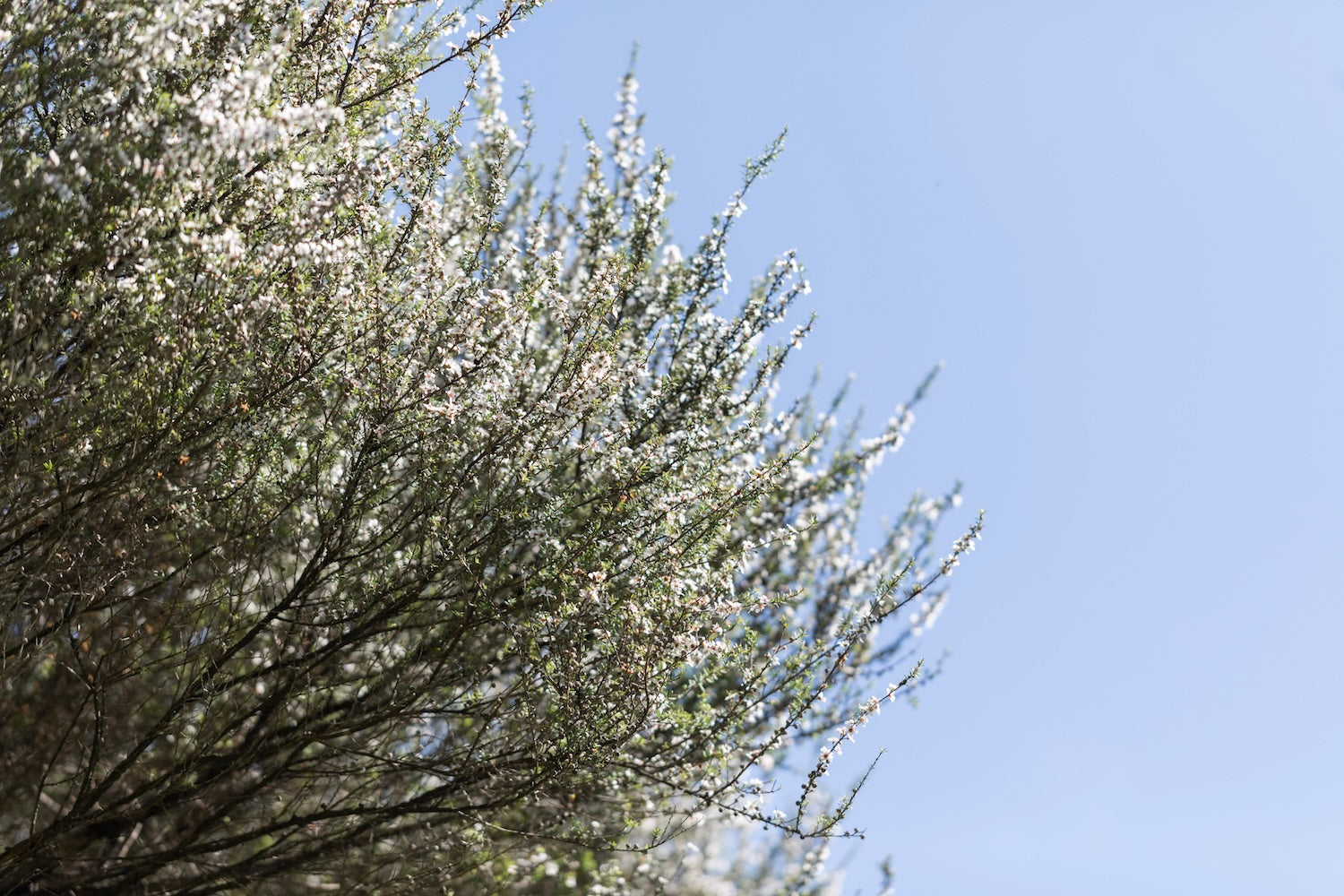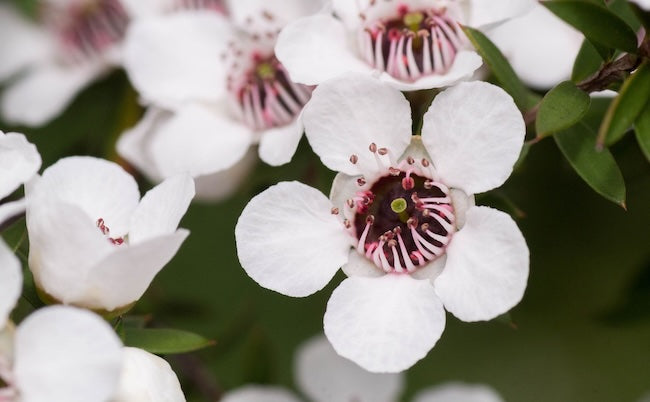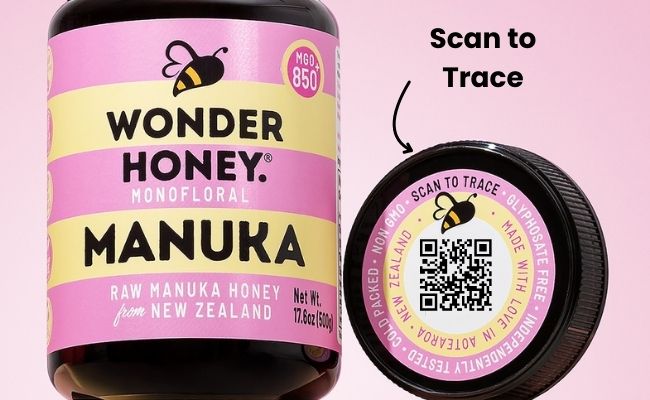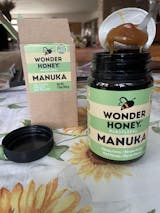
Antibacterial & Antimicrobial Properties
One of the most significant attributes of Manuka honey is its potent antibacterial and antimicrobial effects, which has given Manuka its reputation as great natural alternative to help accelerate wound healing.
The antibacterial and antimicrobial properties of Manuka honey are attributed to several key components:
-
Methylglyoxal (MGO) :
- MGO is a compound found in high concentrations in Manuka honey, responsible for its strong antibacterial activity. Research has shown that MGO can effectively inhibit the growth of various bacteria, including antibiotic-resistant strains such as Staphylococcus aureus and Escherichia coli.
- A study published in the Journal of Antimicrobial Chemotherapy demonstrated that MGO exhibits significant antibacterial effects against a range of pathogens, making it a valuable agent in combating infections.
-
Hydrogen Peroxide :
- Like other types of honey, Manuka honey produces hydrogen peroxide when diluted. This compound has well-documented antibacterial and antimicrobial properties, contributing to the honey's ability to inhibit bacterial growth.
- The production of hydrogen peroxide is a result of the enzymatic activity of glucose oxidase, which converts glucose into gluconic acid and hydrogen peroxide.
-
Other Bioactive Compounds :
- Manuka honey contains various phenolic compounds, such as 4-hydroxyphenyllactic acid (4-HPLA) and 3-phenyllactic acid (3-PLA), which also contribute to its antimicrobial activity. These compounds have been shown to inhibit the growth of certain bacteria and fungi.
-
Antifungal Properties :
- In addition to its antibacterial effects, Manuka honey has demonstrated antifungal properties. Research has indicated that it can inhibit the growth of various fungi, including Candida species, which are responsible for infections such as thrush and yeast infections.
- A study published in the Journal of Fungi found that Manuka honey effectively reduced the growth of Candida albicans, highlighting its potential as a natural antifungal agent.
Human Applications of Manuka Honey's Antibacterial and Antimicrobial Properties
-
Wound Healing :
- Manuka honey has been widely used in wound care due to its antibacterial and antimicrobial properties. It creates a moist healing environment, promotes tissue regeneration, and reduces the risk of infection.
- Clinical studies have shown that Manuka honey can significantly improve healing times for chronic wounds, burns, and surgical wounds. A systematic review published in Wound Repair and Regeneration highlighted the effectiveness of Manuka honey in promoting wound healing and preventing infection.
-
Skin Care :
- The antibacterial and antimicrobial effects of Manuka honey make it a popular ingredient in skincare products. It can help treat acne, reduce inflammation, and promote overall skin health.
- Research has indicated that Manuka honey can inhibit the growth of acne-causing bacteria, making it an effective natural remedy for acne treatment.
-
Oral Health :
- Manuka honey's antibacterial and antimicrobial properties extend to oral health, where it can help combat harmful bacteria in the mouth. It has been shown to reduce plaque formation and improve gum health.
- A study published in the Journal of Clinical Periodontology found that Manuka honey can significantly reduce the levels of bacteria associated with periodontal disease.
-
Digestive Health :
- Manuka honey may also support digestive health by inhibiting the growth of harmful bacteria in the gut. Its prebiotic properties can promote the growth of beneficial gut bacteria, contributing to overall gut health.
- Research has suggested that Manuka honey can help manage conditions such as gastritis and peptic ulcers by reducing the growth of Helicobacter pylori, a bacterium associated with these conditions.
-
Respiratory Health :
- The antimicrobial properties of Manuka honey may also benefit respiratory health. It has been used traditionally to soothe sore throats and reduce coughs.
- Studies have indicated that Manuka honey can inhibit the growth of respiratory pathogens, making it a potential natural remedy for respiratory infections.
The antibacterial and antimicrobial effects of Manuka honey are remarkable aspects of this natural product, making it relevant for various human applications. From wound healing to skincare, oral health, and digestive support, the unique properties of Manuka honey offer a natural alternative to conventional treatments. As research continues to uncover the full potential of Manuka honey, its role in promoting health and well-being is likely to expand further.
References
- Adams, C. J., et al. (2008). "Isolation by HPLC and characterisation of the bioactive fraction of New Zealand manuka (Leptospermum scoparium) honey." Journal of Antimicrobial Chemotherapy , 62(6), 1211-1217.
- Molan, P. C. (2001). "Why honey is effective as a medicine." Frontiers in Microbiology , 7, 569. Link to study
- Jull, A. B., et al. (2015). "Honey as a topical treatment for wounds." Cochrane Database of Systematic Reviews , 2015(3). Link to study
- Al-Waili, N. S., et al. (2011). "Honey and microbial infections: A review supporting the use of honey for microbial control." Journal of Medicinal Food , 14(10), 1079-1096. Link to study
- K. M. M. Alzahrani, M. A. Farag, and M. A. El-Shafey. (2020). "Antimicrobial activity of Manuka honey against various pathogens." Journal of Food Science and Technology , 57(4), 1450-1458. Link to study
<div class="dynamic-checkout__content" id="dynamic-checkout-cart" data-shopify="dynamic-checkout-cart"> <shopify-accelerated-checkout-cart wallet-configs="[{"supports_subs":true,"supports_def_opts":false,"name":"shop_pay","wallet_params":{"shopId":81423728939,"merchantName":"Wonder Honey","personalized":true}},{"supports_subs":false,"supports_def_opts":false,"name":"paypal","wallet_params":{"shopId":81423728939,"countryCode":"NZ","merchantName":"Wonder Honey","phoneRequired":true,"companyRequired":false,"shippingType":"shipping","shopifyPaymentsEnabled":true,"hasManagedSellingPlanState":null,"requiresBillingAgreement":false,"merchantId":"2GGQU7RZZH6TG","sdkUrl":"https://www.paypal.com/sdk/js?components=buttons\u0026commit=false\u0026currency=GBP\u0026locale=en_US\u0026client-id=AfUEYT7nO4BwZQERn9Vym5TbHAG08ptiKa9gm8OARBYgoqiAJIjllRjeIMI4g294KAH1JdTnkzubt1fr\u0026merchant-id=2GGQU7RZZH6TG\u0026intent=capture"}}]" access-token="132b5cac3bedfbcbd7438b6acfedfe5f" buyer-country="GB" buyer-locale="en" buyer-currency="GBP" shop-id="81423728939" cart-id="871171704ab8884f219578e3f146181b" enabled-flags="["ae0f5bf6"]" > <div class="wallet-button-wrapper"> <ul class='wallet-cart-grid wallet-cart-grid--skeleton' role="list" data-shopify-buttoncontainer="true"> <li data-testid='grid-cell' class='wallet-cart-button-container'><div class='wallet-cart-button wallet-cart-button__skeleton' role='button' disabled aria-hidden='true'> </div></li><li data-testid='grid-cell' class='wallet-cart-button-container'><div class='wallet-cart-button wallet-cart-button__skeleton' role='button' disabled aria-hidden='true'> </div></li> </ul> </div> </shopify-accelerated-checkout-cart> <small id="shopify-buyer-consent" class="hidden" aria-hidden="true" data-consent-type="subscription"> One or more of the items in your cart is a recurring or deferred purchase. By continuing, I agree to the <span id="shopify-subscription-policy-button">cancellation policy</span> and authorize you to charge my payment method at the prices, frequency and dates listed on this page until my order is fulfilled or I cancel, if permitted. </small> </div>






